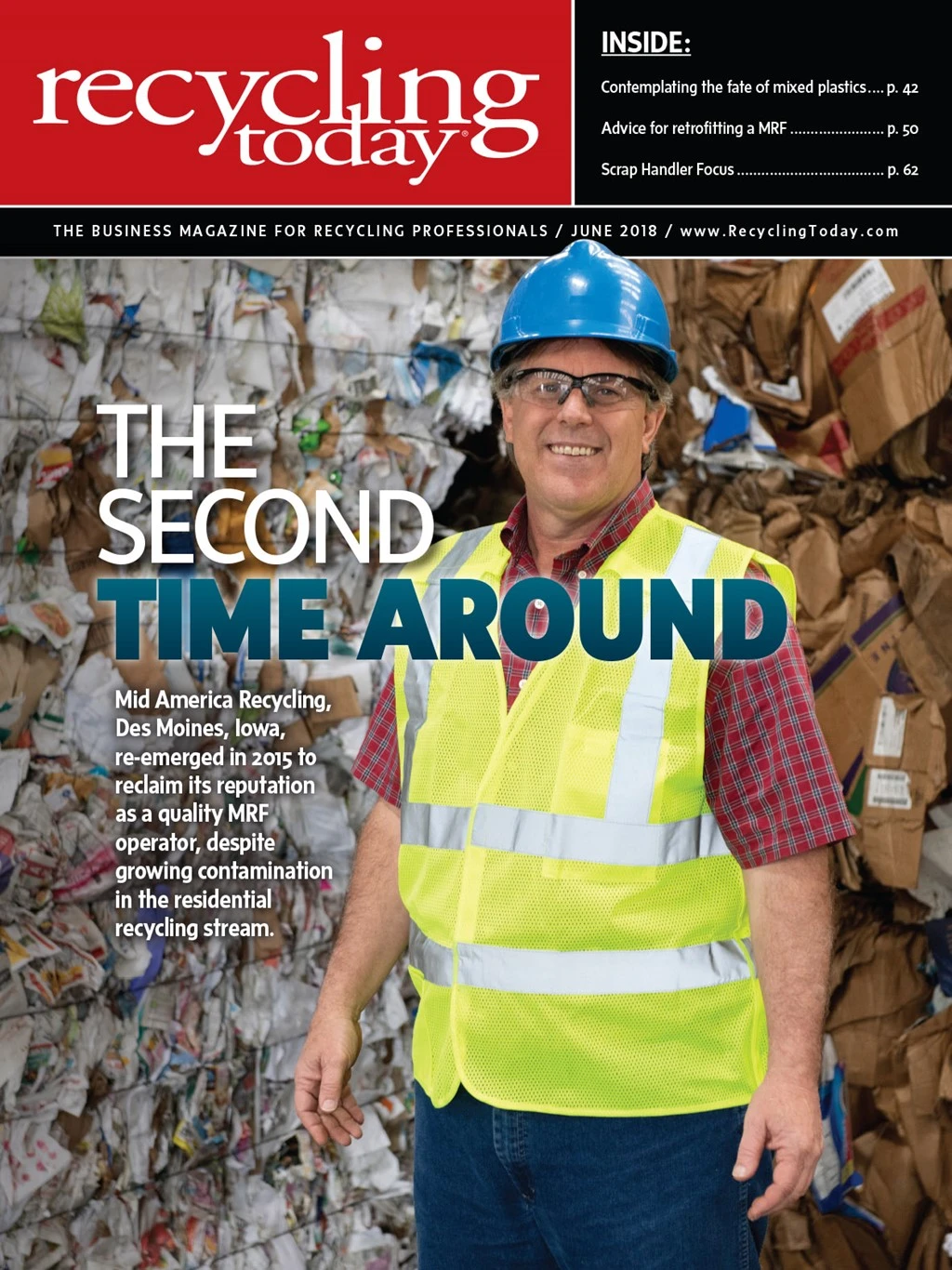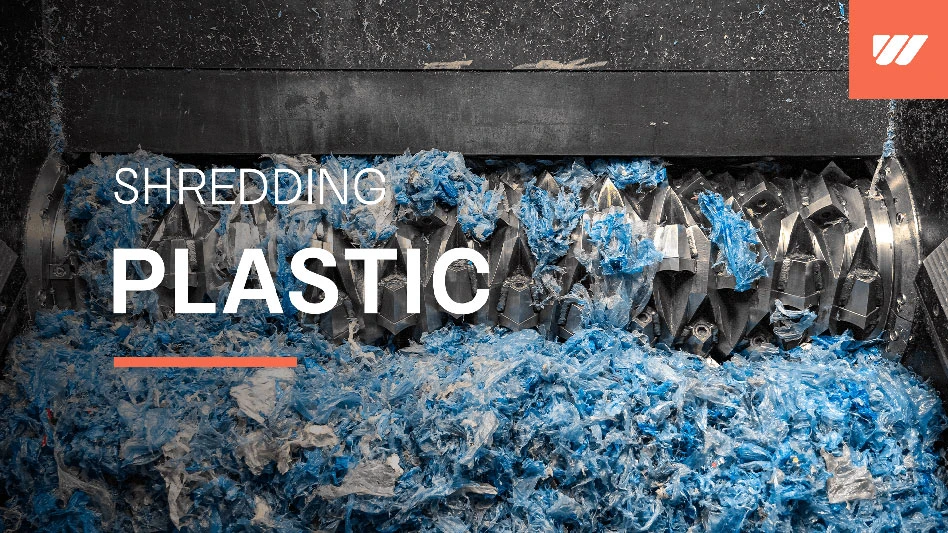
When Adina Renee Adler joined the Washington-based Institute of Scrap Recycling Industries (ISRI) as the association’s senior director of government relations and international affairs in December 2016, she came prepared. Adler had served for six years as the international trade specialist with the U.S. Department of Commerce as well as for four years as the director for South Asia at the Office of the U.S. Trade Representative. She also worked at Fortune 500 companies, including Alcoa, eventually moving to the company’s value-add aluminum and titanium company, Arconic Inc.
This experience has helped her to take on a role with ISRI that requires her to create opportunities for U.S. companies to do business with companies in different countries. She also is tasked with lobbying the U.S. government to support the recycling industry as needed and keeping an eye on regulatory decisions in other countries, helping U.S. recyclers learn how to comply with those requirements, among other duties.
“My main goal, really, is to continue to create the environment for business and international trade to continue,” Adler says.
In the following Q&A, Adler talks about how actions out of China, from import bans to inspection suspensions, have affected recyclers in the U.S., recognizing “time and again that surprises are around every corner.”
Recycling Today (RT): Effective May 4, China suspended U.S. scrap shipments to that country for one month. If China does not revoke the suspension after 30 days, what could this mean for U.S. recyclers who export? What can recyclers do to attempt to prepare for such short-noticed changes?

Adina Renee Adler (ARA): I want to make sure we’re clear that it’s not so much that China announced that it was going to suspend exports, it was that China announced that it was suspending the company that performs the
China announced effective May 4 that it was suspending CCIC (China Certification and Inspection Group) North America’s U.S. operations from performing
It’s been a challenging situation for us at the moment. Only the U.S. CCIC office was suspended, so scrap from other countries can still be exported to China because they can get their inspections.
I don’t know that we’ve really thought through what could happen if the suspension is not revoked. We are hopeful that the Chinese government will stick to that time frame or potentially find another solution to allow trade to restart again.
ISRI has appealed directly to the Chinese government and sought the support of the U.S. government in the talks that are taking place at the moment with China to potentially find a solution past this. We’re hopeful another agency can be approved to do

I’m not sure that I want to speculate as to what could happen if they don’t lift the suspension, but in terms of the second part of your question, what can recyclers do to prepare for such short-noticed changes, I think there’s always ways that businesses can put in processes or plans to protect themselves against the inevitable. But, unfortunately a lot of the inevitable isn’t going to be anticipated. This is one of those situations where it caught our industry completely by surprise. They gave us one-day notice. There was no indication that this was coming, even days before.
We reached out to two of our contacts who always are the first to know. When the ban and the standards and all of these things were being announced, people would find out about it a week or two before the general public would find out and even before we did. We reached out to those people, and they said, “No, we found out at the same time that you did.”
What can a company really do to protect against these announcements? I don’t know. I think you can do everything in your power to protect yourself against such risks, and inevitably you’re going to miss something. Over the course of the last year, in working through this whole new regulatory environment with China, it has sort of been proven time and again that surprises are around every corner.
China has been enacting such regulatory changes for a very long time against many, many different industries, and although the recyclers are feeling it now, they’re certainly not alone in terms of the Chinese government changing the game in terms of international business. It’s just the way it is.
RT: China began importing secondary raw materials in the 1980s and subsequently grew to become the world’s largest importer of recyclables. In what ways could these moves by China reshape trade between it and the U.S.?
ARA: Yes, China’s drive for economic development created a tremendous amount of demand for scrap materials to help fill the gaps in raw materials that they needed to build cities, infrastructure, manufacturing and all that stuff. They did become the world’s largest importer of recyclables because they did value what recyclables could support in the manufacturing process.
What these actions are doing is changing that dynamic. It’s telling us that even though there’s still demand
That’s the dynamic of trade that is starting to take place. In
It’s a whole paragraph about the fact that recycled PET (polyethylene terephthalate) bottles can come in. This translation says chips, but we were told that it’s flake, and that means that flake can move, and we already know that pellets can move—these are melt-ready, manufacturing-ready—and so what this statement is telling us is that they don’t want the bottles, which we’ve known because that is what was banned at the beginning of the year, they want manufacture-ready materials, they want the commodity. Of course, if it’s a commodity, it’s not solid waste anymore, so it doesn’t need to come under the regulations. But, what this confirms is what we’ve been suspecting for the last few months: They don’t want to process scrap from abroad. They want the mill-ready, furnace-ready, smelter-ready material that can go right into making something new. They just want the commodity. And that’s the changing dynamic. So, are we really still going to be talking about scrap exports to China, or are we going to be talking about commodities that were processed from scrap being exported to China?
RT: The Chinese government began taking action to phase out such imports in 2017, citing environmental concerns. How have U.S. recyclers responded to these actions and in what ways have they cleaned up their acts? What more can they do?
ARA: I do take a little umbrage on behalf of our industry with the implication that it was our recyclers’ fault that China went in this direction. I do believe that information has been out there and presented in a way to create certain perceptions within China about materials that come from abroad and how they are handled in China.
For example, the “Plastic China” documentary is horrific. As a mother and as somebody who values the environment, I was horrified by the visuals I saw. But, what is not well-understood is that, No. 1, it highlights a poor recycling operation, just one poor operation, within China because, by the way, they do have some very sophisticated recycling operations in China, and they have some really bad ones. What they don’t have is anywhere kind of in the middle.
No. 2, that operation was processing material that was already banned from import into China. Unfortunately, there has been
Having said that, U.S. recyclers are having to respond to the changing market dynamics that are taking place within China. Also, there are changing market dynamics because of what is going on in China in other parts of the world, and so they are having to adapt. They are thinking about what new recycling technologies they can install in their facilities. Do they need to hire more workers to do better and more separation? They’re finding customers in other parts of the world. They’re finding lots of different ways to adapt to market changes, and that is what is taking place right now.
RT: From rising costs to shortages in truck drivers and rail cars, transportation always has been a source of headaches, yet a necessity, in the industry. How is ISRI helping to manage these problems, especially with rail?

ARA: The overall transportation problems are so much larger than the scrap industry that even the largest shippers (agriculture, coal, timber, chemicals) do not have many success stories.
The nation’s transportation systems have not kept pace with the growing economy. The rail industry has shifted in response to moving raw materials around but without
ISRI has not done much on trucking issues since legislation to increase truck weights failed a few years ago. ISRI sees an opportunity to work with other associations, such as the American Trucking Associations (ATA), on issues of common interest.
Regarding rail, ISRI led an effort to revoke the ferrous scrap/steel exemption. However, the rule is in limbo without a full Surface Transportation Board (STB). ISRI has also had success in getting the STB to intervene in a number of instances where rail service was discontinued or was very poor. Recyclers that took advantage of that effort are not experiencing as many problems as others.
RT: China announced in mid-April that it would ban imports of 32 additional types of scrap materials, and ISRI was scheduled to visit China in late April to get more information. How did this meeting go and what came of it?
ARA: That [mid-April] announcement had come while we were at [the ISRI2018] convention, and yet we were scheduled to go to China immediately after. Unfortunately, the restructuring of the Chinese government put a kink in our plans to try to have some engagements with the Chinese government. Officials were not able to meet with us partially because some officials were being reassigned, so they didn’t feel comfortable meeting, and I’m told that this was across a whole bunch of people, not just us that they weren’t able to have meetings with. We were not able to meet directly with the Chinese government; but, we were able to take advantage of the visit to reach out to our partner organizations, like the China Scrap Plastic Association, the China Iron and Steel Association—which does a lot of work with ferrous scrap—and some others to check in and see what’s happening in the markets.
We also attended a couple of conferences that gave us some good insight into what’s going on within China as it relates to China’s changing demand structure for scrap. One conference was Chinaplas, the plastic industry’s big trade show. It wasn’t just specific to recycling, but it was all the plastic associations, and the event was just enormous in terms of scale and size, and every component of the plastic manufacturing supply chain was present within China, and recycling was very much a part of that. It gave us an insight into just how big those industries are in China, especially on the recycling side, and how much they are moving up the chain in terms of the capabilities they have to recycle plastic scrap. It was quite eye-opening that they are bigger and getting better.
We also attended the 11th International Metal Recycling Conference, which had a little bit of a focus on nonferrous metals, but mostly was focused on ferrous metals. We got information that the Chinese steel sector is going to be installing even more electric-arc furnaces, so demand will remain strong for steel scrap. The Chinese government, as part of its environmental drive, is looking at a zero waste society, and one big question that was repeated over and over was finding the best solutions for recycling steel slag, which is a byproduct of the steelmaking process, and there’s a lot of it. Instead of allowing it to pollute the surrounding environments, they want to try to find something useful for it, whether you can recycle it back into a useful product or if it’s for energy generation.
Even though we were not able to see the government, we still felt like we had some good opportunities to get some insights and updates on what’s going on in China.
RT: ISRI recently praised what it said was “very positive news” when the preshipment inspection certification (PSIC) requirement for scrap metal was lifted at six ports in India, citing more than three years of advocacy by the Material Recycling Association of India (MRAI), which ISRI strongly supported. Talk about the importance of collaboration to progress the industry.
ARA: This is one of our biggest functions within ISRI—to partner with other organizations so that we can build the volume of the messaging even bigger and help the policymakers understand the broader implications of certain issues or policies on a wider swath of society.
Within the United States, we partner with a whole host of organizations: SWANA (Solid Waste Association of North America), the National Waste & Recycling Association (NWRA), Keep America Beautiful, The Recycling Partnership, National Recycling Coalition (NRC). And then there’s the steel industry, the aluminum industry, the paper industry and the plastics industry. Just within the United States, we partner with all of them on a whole range of different issues because we all cover different constituencies, and this is a way where we can show the U.S. government—whether it’s at the federal, state or local level—that all of these communities are impacted by certain issues or policies. We’ve also started to come together to think about how the recycling industry moves forward in light of the market dynamics that are starting to change. We’re not talking about how do we get back into the Chinese market; we’re talking about how does the industry adapt to the changes that the situation in China highlighted? We have a lot of work going on there.
Within China we work very closely with the China Scrap Plastic Association; the China Resource Recycling Association, which does a lot of work with the paper folks; the China Nonferrous Metals Association; and the China Iron and Steel Association to share information and make sure customers and suppliers fully understand what’s going on in terms of changing regulations there.
India remains a very important market for U.S. scrap materials of all types: metals, paper
You’ll note that the
Get curated news on YOUR industry.
Enter your email to receive our newsletters.

Explore the June 2018 Issue
Check out more from this issue and find your next story to read.
Latest from Recycling Today
- Recyclers likely to feel effects of US-China trade war
- BCMRC 2025 session preview: Navigating battery recycling legislation and regulations
- Yanmar Compact Equipment North America appoints new president
- LYB publishes 2024 sustainability report
- Plum Creek Environmental acquires Custom Installation LLC
- Avis introduces Harris American Co.
- International Paper in talks to divest 5 European box plants
- Recycled PP from Polykemi, Rondo Plast used in flood protection product








